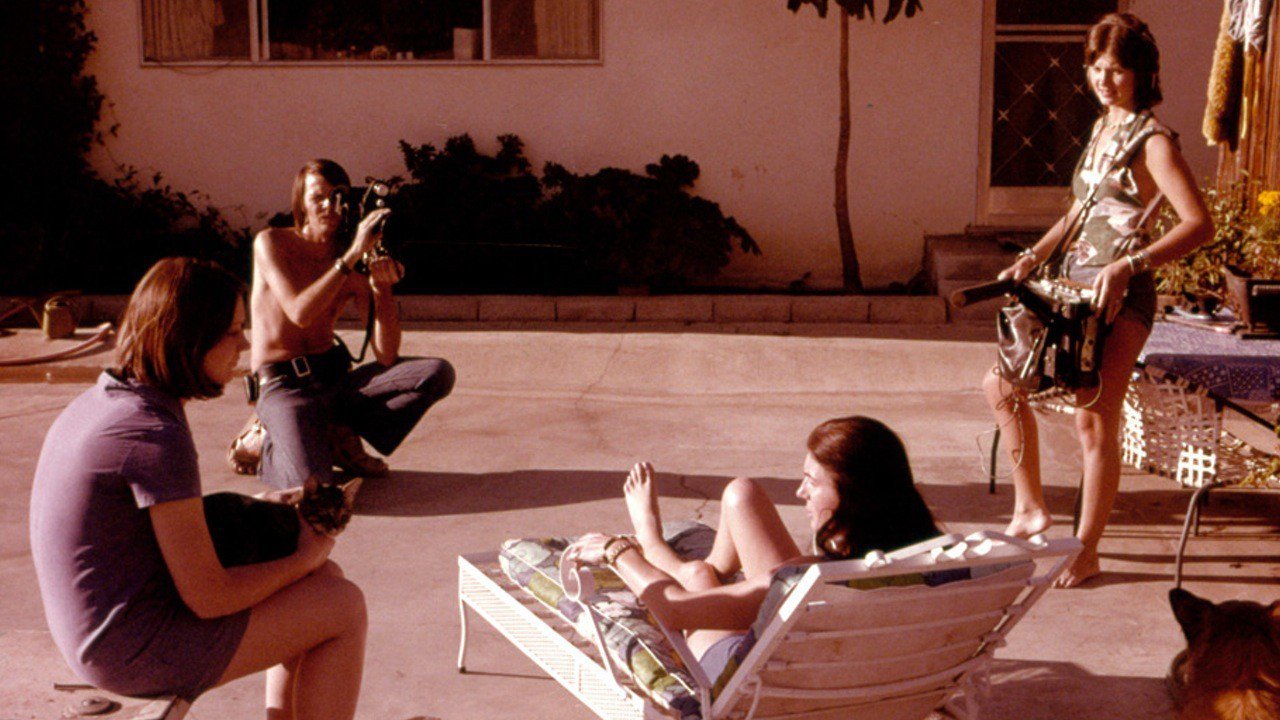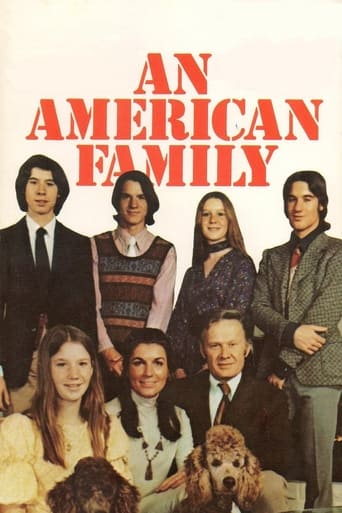

I've been chomping at the bit for several years to see this, and it's thankfully been made available - albeit in a severely truncated form. "An American Family" was a 1971 experiment in cinéma vérité that placed a camera crew in an upper-middle class Santa Barbara household - The Louds - for a period of six months. The resulting footage was edited into a 12-hour miniseries that aired on PBS in '73. That miniseries would become part of the national conversation (for months) and make television history.And I use cinéma vérité because that's exactly what this is: cameras observing the interactions and behavior of a particular subject matter. There's no commentary, no plotted narrative to abide and no comic music strategically used to let us know when we're supposed to laugh. So to compare it to the current crop of "reality-based" TV is both unfair and disingenuous.Within the 2-hour pared-down material, we meet the Loud family (parents Bill and Pat, kids Grant, Kevin, Lance, Delilah and Michele) during a half-year that sees foundational shifts in the family. Lance, having recently come out to his family has moved to New York City, while Bill and Pat, in a gradually deteriorating relationship, file for divorce. Son Grant gets some screen time and attention as the apathetic teenager who squares off with his self-made man father over what he'll do with his life. The other siblings go largely ignored, leaving me to wonder what material of theirs was left on the cutting room floor. And that's really my only beef with this disc. The compression into 120 minutes leaves no breathing room, and the other members of the family get backseat treatment. Aside from that, the image and sound quality are pretty rough, but this is a 40 year-old TV series that was shot on 16mm. No complaints. I'm also curious as to how this family was chosen, and why the producers didn't go with a less well-off household. The house at 35 Woodale Lane is no shoebox, and Patricia's close friend even tells her "You don't even know what it is to be unlucky". Bill is constantly on his kids to be enterprising and work hard for a living; Pat and the kids, on the other hand, definitely come off as those who have never known hard times. Producer Craig Gilbert, in his introduction, says, "The Louds are neither average nor typical. No family is. They are not THE American family. They are simply AN American family". The choice of such a nicely-appointed household, makes me wonder if they make better lab rats for us to peak in on. Or maybe just see how other richer people have it in life. The bottom line is this: this is an utterly fascinating experiment. It requires you to remember that this was filmed in a time and place where Reality TV didn't rule the airwaves. Manufactured drama wasn't everywhere you looked. So to see this family go through such shifts made for a TV show that was truly ahead of its time. I'm genuinely thankful to have what's so far been released (the full affair is tied up in music licensing hell). I see "An American Family" as a footnote in television (hell, even American) history, so I'll see it any way I can get it. Watching this is like watching Albert Brooks' "Real Life" or "Network"; both posit such an outrageous situation that it's all the more hilarious (or disturbing, depending on your point of view) when TV networks adopt that absurdity for cheap junk food TV. This is nothing like Reality TV. This is history; bold, unique, and absolutely mesmerizing.7/10
... View MoreIf you found An American Family dull, you weren't watching it properly. In order to appreciate this documentary, you have to take it as a very special, intimate look at a family with some dramatic twists and turns, accompanied with a fascinating "slice of life" look at how things were in 1971, the year the documentary was filmed. There are so many more interesting elements to the program aside from the bits where Lance was involved -- Grant and his striving for rock and roll success while chafing under the expectations of his parents; Kevin and his struggle to carve his own identity while being a good, honorable, decent, and obedient son; Delilah and her struggles to grow up in a tumultuous family environment while keeping up with her passions and responsibilities; and Michelle and the roller-coaster of a ride she's on as she copes with the gargantuan highs and lows of early adolescence.Then there's Pat and Bill. Their relationship and its attendant struggles forms the centerpiece of this fascinating documentary. Unbeknownst to the viewer in the first half of the program, Pat's suspicions of Bill's multiple affairs has been verified and solidified and this spurs her own to make plans of her own. But Bill is no ogreish cad -- he, like everyone else in this program, is extremely likable, so when he arrives back home at the beginning of episode 9 and Pat presents him with her attorney's information and tells him to move out, it is nearly torturous to watch. The whole of the episode is thus tinged with that element of sadness, even at the very end when Grant sits down with his family (minus Bill and Lance) and strums rock and roll songs. By that time you've gotten to know everyone -- and seen just how accurate Lance was with his overall assessment of his siblings (i.e. very accurate) -- and it feels like this is happening to friends or relatives of yours.This is the finest example of the "reality TV" genre out there. It's incredibly emotionally involving, the Loud family are all very likable (something no other reality TV program can claim), it's a perfect time capsule for an era and a time that hasn't gotten much actual memorialization (only kitschification), and it is a highly entertaining program to watch. And it stands the test of time.
... View MoreI remember this show from when I was a college student. I even had a moronic professor who assigned us episodes to watch. It always rubbed me the wrong way, and I had to endure lynch mob-like opprobrium from my contemporaries when I tried to explain why. Especially when I said that I hoped Lance would just get it over with and commit suicide already rather than torturing his family (who loved him and accepted his homosexuality) with his constant false alarms and solipsistic behavior.The show reminded me of the sort of TV programs shown in the futuristic society depicted in 1966's "Fahrenheit 451". A time and place where books and independent thought were banned. That film (based on an earlier book by Ray Bradbury) seemed dated, even by the 70s, but is more topical than ever now. And it reminded me of this series, where the lives of insufferably self centered people supplant any and all larger concerns, including abstract and critical thought itself. The fact that this travesty ran on a publicly funded station makes it a milestone in the dumbing down of our society.Group narcissism at it's most nauseating!
... View MoreWhile channel-surfing last night I came across what appeared to be an old, fuzzy color film of a drag queen review on Public TV last night. Intrigued, I looked it up and discovered it was an episode of the old pioneering reality series "An American Family," something I had completely forgotten for the last 30 years. This was the episode where Pat Loud goes to New York to visit with her son Lance, who was openly gay and living beyond his means at the Chelsea Hotel amongst other arty young gay men. This must have been pretty shocking stuff for the early 1970s. I really knew nothing about Lance, but listening to his very young self rambling incoherently about what he wanted out of life, I felt a bit sad for him, and on searching the Internet the next day I found out that he had died from complications of AIDS in 2001. He lived a colorful life that was not without success (punk band front man, journalist), but back then in the 1970s he looked to me like one sad, confused kid.I still recall the media hype surrounding this series, and watching the premier back in 1973 when it first aired. What struck me most about this California family then was their considerable affluence, so foreign to my own life experience. I remember seeing a report, aired some time after the series had run, in which Corporate executive Bill Loud (the father) complained about the effect it had on the life of his family, and how his co-workers regarded him. That "Lance in New York" episode certainly must have given those old-fashioned corporate guys a good chuckle. But the report also spoke to the vehement class hatred which the series had unexpectedly stirred up. Letters sent to the Loud family contained threatening statements like "you'd better watch out for your kids," and so on. I can, in fact, vividly recall the Loud siblings being introduced one by one in that premier episode, and the shout of disdain my mother issued when the youngest son was shown noisily practicing his trombone in his bedroom. Why that disdain for such an innocent activity? Well, if you've spent your entire life living in cramped urban apartments, you know that you can't let your child learn the friggin' trombone at home (assuming you can buy the damned thing for him in the first place), unless you want to risk eviction. Envy? Yeah, sure, but sometimes it gets the better of you. Class hatred in this country seems likely be exacerbated in the next few years by both the major political parties. Some things never change.This New York episode was certainly a fascinating time capsule of the late hippie era. I wonder if you can still climb to the top of a fountain in the park (as someone was shown doing in this episode) without getting arrested in what is still pretty much Giuliani's New York?
... View More